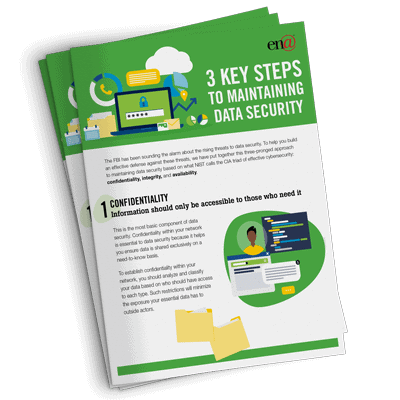The FBI has been sounding the alarm about the rising threats to data security. To help you build an effective defense against these threats, we have put together this three-pronged approach to maintaining data security based on what NIST calls the CIA triad of effective cybersecurity: confidentiality, integrity, and availability.
1) CONFIDENTIALITY
Information should only be accessible to those who need it
This is the most basic component of data security. Confidentiality within your network is essential to data security because it helps you ensure data is shared exclusively on a need-to-know basis.
To establish confidentiality within your network, you should analyze and classify your data based on who should have access to each type. Such restrictions will minimize the exposure your essential data has to outside actors.
2) INTEGRITY
Only approved actors should be allowed to modify your data
Restricting access to your most vital data is not in itself sufficient to maintain data security: you must also restrict who is able to make changes to your information. In many cases, you will want to grant editing privileges to only a portion of those who are allowed access to your data.
To ensure integrity, you must also be able to track changes and ensure authenticity, even when data is transferred. To do so, you must implement controls that ensure your network is free from unauthorized manipulation of the system, whether intentional or accidental. System logging will enable administrators to track manipulation.
3) AVAILABILITY
Data must always be accessible to those who need it
For your data security system to be effective, team members who need to access your data must be able to do so when they need it.
To ensure availability in this time of increasing threats to your security, it is essential for organizations to establish data backups and disaster recovery practices to ensure critical operations continue without disruption.

